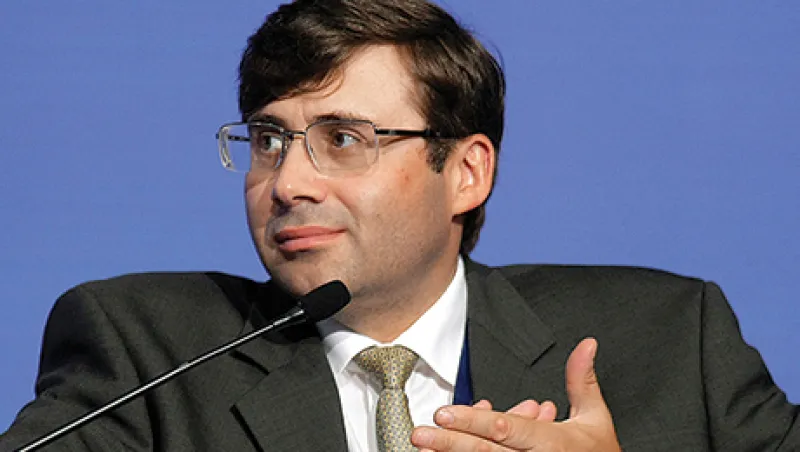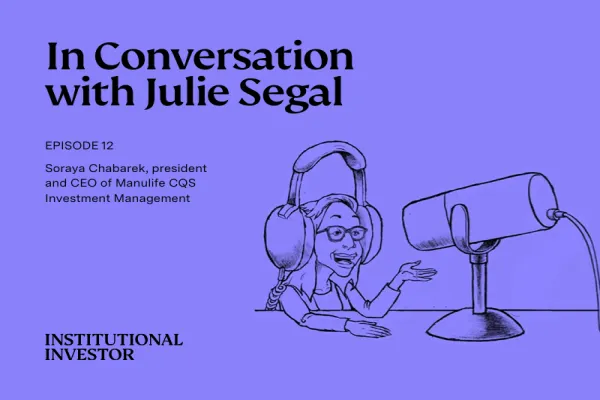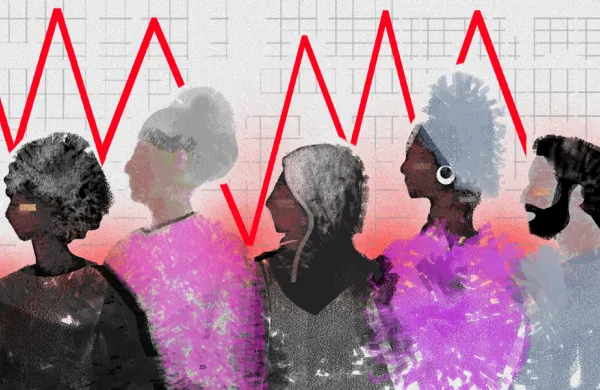Uniting a variety of regulatory agencies under the umbrella of the Central Bank of the Russian Federation may seem like a thankless mission given the ineffectual records of those bodies, but Sergey Shvetsov, the central banker charged with the job, brings optimism and a strong sense of purpose to the task.
Russians have invested only 9 percent of their savings in their country’s stock market, compared with about 40 percent for Americans, Shvetsov told a recent investor gathering in New York. Some 80 percent of Russians’ nest eggs is stashed in bank accounts, where it does little to help finance the country’s development. Increasing investment in equities and other securities can boost Russian business and provide the long-term money the economy has lacked since the end of the Soviet era, he says.
“We have funding available from Russian citizens,” says Shvetsov. “What we need to do is increase the level of corporate governance to build confidence in the markets.”
A 42-year-old central bank veteran, Shvetsov heads the Bank of Russia Financial Markets Service, which on September 1 took over as the country’s single regulator, overseeing everything from securities firms and insurance to pensions. Shvetsov has wasted no time in his new job, drafting legislation and initiating a series of reforms.
At the top of his list is a new corporate governance code, under consideration in the Duma, that Shvetsov sees as critical to checking the ability of majority owners to abuse the rights of minority shareholders. Most publicly listed Russian companies are still dominated by a single shareholder — either the state or a founding oligarch. Their ability to run roughshod over minority interests has burned investors in companies ranging from Yukos Oil Co. to Rosneft, the state-controlled business that absorbed most Yukos assets after the imprisonment of the oil company’s CEO, Mikhail Khodorkovsky. The new code will require a legitimate economic rationale for changes in dividends, which controlling shareholders have often manipulated for their own benefit. It will also strengthen the role of and standards for independent directors and “clarify that it is the function of the board to appoint management,” Shvetsov says.
Persuading corporate owners to give up their domineering ways will not be easy, he admits. “I believe that in three to five years Russian markets will gravitate to world norms,” Shvetsov says. “But for the next one or two years, we will need support from the government and investors.”
A second priority is facilitating the ability of foreign investors to trade Russian equities through the Euroclear settlement system. In February, Brussels-based Euroclear introduced settlement for domestic Russian sovereign bonds; foreign participation in that market has increased to 25 percent from less than 10 percent. Russian authorities hope to add ruble corporate bonds by the end of this year, Shvetsov says. But settling stocks through Euroclear requires additional measures, such as software to enable electronic shareholder voting, as well as legislative tinkering with various tax issues. Shvetsov hopes to get those elements in place by July 2014.
Besides opening Russian markets wider for foreign investors, Shvetsov is overseeing a sweeping overhaul of the country’s private pension system. Domestic pension funds have accumulated some $100 billion since a 2002 reform allowed workers to divert a portion of their state old-age savings into private plans. In October, President Vladimir Putin announced a one-year suspension of private pension contributions, contending that the system was untrustworthy and risked creating a new class of “deceived depositors.” Fund managers fear their business may be dismantled altogether, but Shvetsov insists contributions will resume in 2015 to a better-regulated system. A bill currently before the Duma would convert pension funds from “nongovernment organizations” to joint stock companies, making them more transparent, and provide a state guarantee of capital paid in by pension savers, he says.
The CBR plans to alter a rule that requires pension funds to show positive returns each calendar year. That stipulation has effectively forced private pension plans to invest almost exclusively in sovereign bonds and prevented them from going into the stock market and other longer-term investments. The new regulations, which also must be approved by the Duma, will extend to five years the window in which fund managers must show profits. It will restrict savers from changing their pension plans more than once in five years, to give the industry more stability.
Shvetsov’s ambitions range even further. He intends to bring proper regulation to Russia’s burgeoning nonbank lending sector, known locally as microfinance. Shortly after Shvetsov’s speech in New York, the Interior Ministry announced that Microfinance Center, a leading player in this sector, had swindled 10.5 billion rubles ($310 million) of state subsidies from new mothers by falsely promising the funds would finance apartment purchases.
Shvetsov brings little market experience to this daunting agenda. Except for five years heading the Moscow office of Ost-West Handelsbank, from 1996 to 2001, he has been climbing the ladder at the central bank since earning his degree in economics and math from Moscow State University in 1993. But financial pros say he could hardly do worse than the now-defunct Federal Commission on Securities Markets and other forerunner agencies. “Basically, these sectors were not regulated at all in the past,” says Anatoly Aksakov, vice chairman of the Duma’s banking committee and president of the Association of Regional Banks. The government has made painfully little progress toward its goal of turning Moscow into an international financial center. Most of the few Russian companies that have gone public since 2008 have preferred to list in London, New York or Hong Kong, and for good reason. Shvetsov notes that shareholders pay a premium of as much as 14 percent to buy global depositary receipts issued by Russian companies rather than the underlying domestic equities — one more problem he is looking to untangle eventually.
Investors wish him luck.
See also “Central Bank Chief Is Charting a New Course for Russia”.






